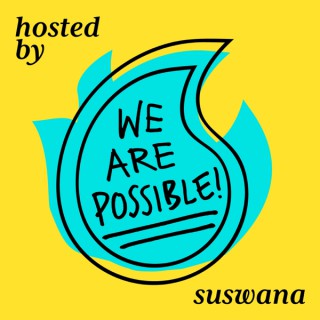We Are Possible
Follow We Are PossibleYou can try and stop us but it's too late - we're already on our way to conquer the world. Each episode I'll be talking to my South-Asian Americans who are bringing our culture to the forefront and redefining possible.
- Feb 9, 2018 LATEST EPISODE
- infrequent NEW EPISODES
- 31m AVG DURATION
- 6 EPISODES
Latest episodes from We Are Possible

Badal Patel started off majoring in biochemistry in college but two and half years later decided to make the switch to a graphic design major, her real passion. Years later when she went to buy her friend a wedding card, she realized outside of India there aren't a lot of awesome stationery options for South Asian-Americans, so she created by Badal to help fill in the gap. We talk about her path change in college, her appreciation for the Indian culture now and where she's planning on taking by Badal.

Trisha Sakhuja-Walia joined Brown Girl Magazine as a writer in college and it wasn't long before she moved on from becoming a lawyer and started pursuing her creative passions and now she's quit that day job and is taking Brown Girl Magazine full-time. We talk about the challenges in leading the magazine, the voice it provides for the South Asian community and how Canada seems to keep winning in everything.

Rupa Parekh and her husband wanted to teach their children about their culture but realized they didn't know how to and they couldn't find the proper tools to help them either. Working with artist, Ajinkya Bane, Rupa created Jai Jai Hooray under her parent company Umani Studio to help parents introduce their kids to the Hindu gods and goddesses. Umani is named after her two kids, Uma and Niko. In this episode, we talk about how she wants to start a movement with Umani, the role of her mom in inspiring Jai Jai Hooray and you also learn how to pronounce my name correctly.

Mehjabeen Hassan started her indo-western fashion label in 2015 combining both her Bangladesh and NYC roots. But she also has another career path she's pursuing: law. Mehjabeen has always wanted to be a lawyer and a fashion designer and is determined to achieve both. In this episode we get deep and discuss how she's a little crazy, Bangladesh's unique culture and fashion sense, and her biggest failure with the label.

Mahfuzul Islam realized he could both share his Bengali culture and food with a wider American population in NYC while also help employ Bengali stay at home mothers and new immigrants. Thereafter Jhal NYC was born, a social entreprenurship venture empowering the Bengali New York community through food. In this episode we talk about how it all started, the impact Jhal has already had and what specifically makes Bengali food unique from other South Asian cusines.

Raeqa Mahmud is on a pre-med track but has always had a love for art so she created doodles4change, a non-profit aimed towards improving healthcare facilities in rural Bangladesh. We talk about some of the patients she's helped, her very first doodle as a child and how her mom's honesty made her a better artist.








